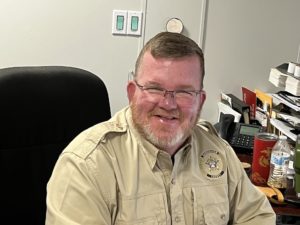
If you’re a fan of Law & Order, you’ve seen multiple episodes about police officers who’ve been involved in critical incidents and are personally struggling with what happened. Invariably, the officers refuse help and rail against the system for making them feel as though they have mental issues.

According to Matt Wurtz, the training officer for the Habersham County Sheriff’s Office, that Law & Order theme does not capture the reality of how law enforcement officers are now treated after critical incidents.
Wurtz, who has spent his entire career in law enforcement, remembers when officers did face a mental health stigma if they admitted they needed help in dealing with things they’d seen and experienced. That stigma was the norm across the United States and within law enforcement agencies. It’s been suggested that this “unwillingness to establish a mental health baseline in currently operating officers [was] based on the fear that some of them may be unfit to serve.”
Wurtz emphasizes that the stigma of seeking mental health assistance has been broken and replaced with a new openness to seeking help through mental health professionals.

Kevin Angell, HCSO public information officer and investigator, agrees: “The Habersham Community has been very supportive of police officers here. It comes down from community leaders and from local government officials. They respect us for who we are and what we are.”
That support is seen in the layers of help and accountability that have been built into the agency’s personnel. The chain of command includes peer team members, chaplains, and professional mental health counselors. The sheriff’s office also has an executive-level staff member who oversees the process as well as an Employee Assistance Program through which officers can receive help. According to Angell, officers have the freedom to go to anyone in the chain of command to seek help without judgment or bias.
“The work of law enforcement offices is difficult and demanding,” he states. “On a daily basis, officers can possibly face or be involved in violent situations.”

Working at that level of anticipated stress can take its toll. According to Angell, most of us will face a maximum of 10 critical incidents or traumatic events in our lifetimes. However, according to a 2015 study, police officers face an average of 188 critical incidents in their lifetimes. Some studies suggest that number is much higher.
The stress of working in law enforcement is showing up in other ways as well. According to Wurtz, officer job retention has decreased over the last ten years, possibly because of the job demands and stress. That makes recruiting new officers even more difficult.
The problems with retention may depend upon the ability of young officers to get mental health help when needed.
The attention to the mental health of law enforcement is a national issue, and there has been progress. Angell shares that the nationwide suicide rate for law enforcement was down by 5.4% in 2021 and 22% for the same time period in 2022.
 However, the seriousness of removing the stigma of seeking mental health help cannot be overstated. According to the National Alliance on Mental Illness (NAMI), law enforcement officers have “much higher rates of depression, burnout, PTSD, and anxiety than the general population.” And more than 35% of officers have at least thought about suicide at least once in their lifetimes.
However, the seriousness of removing the stigma of seeking mental health help cannot be overstated. According to the National Alliance on Mental Illness (NAMI), law enforcement officers have “much higher rates of depression, burnout, PTSD, and anxiety than the general population.” And more than 35% of officers have at least thought about suicide at least once in their lifetimes.
While the numbers are higher for law enforcement members struggling with mental health issues than those of the general public, the numbers of civilian adults and children struggling with mental health issues are also on the rise. Only when the stigma against seeking help for mental health issues is removed will real progress be seen.
If you or someone you know is struggling with mental health issues, call the NAMI Helpline at 800-950-NAMI, or in a crisis, text “NAMI” to 741741. For more on Mental Health Awareness Month and mental health resources available to you, visit NAMI online or CDC.







